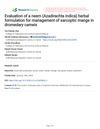 1 citations,
September 2017 in “Frontiers in Laboratory Medicine”
1 citations,
September 2017 in “Frontiers in Laboratory Medicine” Gut flora changes could potentially indicate depression, but more research is needed.
 43 citations,
July 2012 in “Molecular human reproduction”
43 citations,
July 2012 in “Molecular human reproduction” Certain metabolites are lower in women with PCOS and could be potential markers for the condition.
2 citations,
July 2022 in “BioMed Research International” Finasteride-loaded nanogels are effective, safe, and improve drug absorption through the skin.
 176 citations,
June 2017 in “Sexual Medicine Reviews”
176 citations,
June 2017 in “Sexual Medicine Reviews” Erectile dysfunction is increasingly common in men under 40, with many physical and psychological causes, and various treatment options available.
 February 2020 in “International Journal of Advanced Research”
February 2020 in “International Journal of Advanced Research” The Garcinia Cambogia Nutri Bite could help manage PCOS symptoms.
 57 citations,
October 2013 in “international journal of endocrinology and metabolism”
57 citations,
October 2013 in “international journal of endocrinology and metabolism” Female pattern hair loss is common, linked to polycystic ovarian syndrome, and treated with topical Minoxidil.
The new minoxidil gel reduces runoff and improves eyebrow hair growth.
 9 citations,
October 2012 in “Frontiers of Hormone Research”
9 citations,
October 2012 in “Frontiers of Hormone Research” Antiandrogens are the main treatment for hirsutism, with individualized care and safe, affordable options needed.
 155 citations,
August 1991 in “Journal of The American Academy of Dermatology”
155 citations,
August 1991 in “Journal of The American Academy of Dermatology” Methotrexate treats various disorders by inhibiting DNA synthesis, but careful monitoring is needed to avoid toxicity and manage side effects.
 1 citations,
January 2023 in “Research Square (Research Square)”
1 citations,
January 2023 in “Research Square (Research Square)” A neem-based herbal treatment worked better than ivermectin for sarcoptic mange in camels, improving their recovery and overall health.
 April 2008 in “Obstetrics, gynaecology and reproductive medicine”
April 2008 in “Obstetrics, gynaecology and reproductive medicine” Hirsutism is often caused by high male hormone levels and can be treated with lifestyle changes and medications.
 8 citations,
March 1979 in “International Journal of Dermatology”
8 citations,
March 1979 in “International Journal of Dermatology” Dr. Vera H. Price's 1979 work emphasizes the importance of accurate diagnosis and personalized treatment for hair loss.
 5 citations,
March 2001 in “Clinics in Dermatology”
5 citations,
March 2001 in “Clinics in Dermatology” Diagnose and manage hair issues in women by checking medical conditions and using personalized treatments.
 January 2023 in “Kafkas üniversitesi veteriner fakültesi dergisi/Kafkas üniversitesi veteriner fakültesi dergisi”
January 2023 in “Kafkas üniversitesi veteriner fakültesi dergisi/Kafkas üniversitesi veteriner fakültesi dergisi” Seasonal changes affect gene activity linked to hair growth in Angora goats.
April 2024 in “Journal of clinical medicine” Classical PCOS types A and B are most common and linked to higher health risks.
Genetic analysis of rabbits identified key genes for traits like coat color, body size, and fertility.
 6 citations,
February 2014 in “Actas Dermo-Sifiliográficas”
6 citations,
February 2014 in “Actas Dermo-Sifiliográficas” Obesity is linked to skin conditions like acanthosis nigricans and skin tags, which may indicate high insulin levels.
 June 2023 in “Journal of multidisciplinary sciences”
June 2023 in “Journal of multidisciplinary sciences” PCOS may increase the risk of certain cancers.
 2 citations,
April 2018 in “Natural Product Communications”
2 citations,
April 2018 in “Natural Product Communications” Cynomorium songaricum has many health benefits and could help with hair regrowth.
24 citations,
March 2022 in “Genome biology” scINSIGHT accurately identifies cell clusters and gene patterns in complex data.
 75 citations,
October 1999 in “European journal of endocrinology”
75 citations,
October 1999 in “European journal of endocrinology” Finasteride is a safe, effective treatment for hirsutism with fewer side effects.
 31 citations,
January 2017 in “Phytotherapy Research”
31 citations,
January 2017 in “Phytotherapy Research” Ziziphus jujuba Mills may have health benefits, but more research is needed to confirm its safety and effectiveness.

Women with PCOS have lower self-esteem and body image satisfaction.
 36 citations,
January 2018 in “Scientific reports”
36 citations,
January 2018 in “Scientific reports” Eating glucoraphanin can help prevent psychosis in offspring whose mothers had immune system activation.
 13 citations,
May 2019 in “Cancer Prevention Research”
13 citations,
May 2019 in “Cancer Prevention Research” Grape seed extract may safely and effectively help prevent lung cancer.
 86 citations,
January 2019 in “Frontiers in Immunology”
86 citations,
January 2019 in “Frontiers in Immunology” The document concludes that diagnosing and treating Human African Trypanosomiasis is challenging, but new treatments like fexinidazole are promising.
 10 citations,
August 2023 in “Advanced Science”
10 citations,
August 2023 in “Advanced Science” Nitric Oxide has potential in medicine, especially for infections and heart treatments, but its short life and delivery challenges limit its use.
 183 citations,
January 1987 in “British Journal of Anaesthesia”
183 citations,
January 1987 in “British Journal of Anaesthesia” Opioid painkillers can cause many side effects, including breathing problems and addiction, but are generally considered safe when used properly.
 November 2022 in “CARDIOMETRY”
November 2022 in “CARDIOMETRY” A group has developed therapies that show promise for treating cancer and various other conditions.
 November 2022 in “Research Square (Research Square)”
November 2022 in “Research Square (Research Square)” Seasonal changes affect hair growth genes in Angora goats, possibly influencing mohair quality.

























